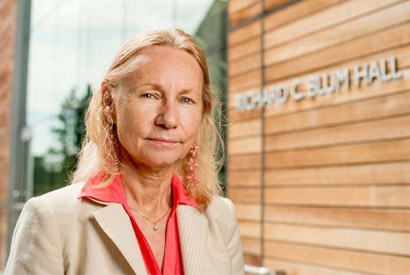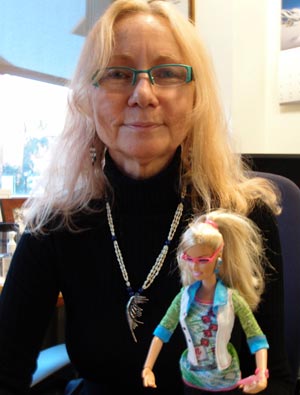The making of a ‘lifetime mentor award’ winner
Mechanical-engineering professor Alice Agogino has been named winner of the AAAS Lifetime Mentor Award. In a Q&A with the NewsCenter, she talks about her influences and her efforts to transform a profession, from human-centered design to blogging and Barbies.

January 28, 2013
One of UC Berkeley’s own, Alice Agogino, will be in Boston Feb. 15 to accept the Lifetime Mentor Award from the American Association for the Advancement of Science. The mechanical engineering professor, who joined the Berkeley faculty in 1984, is being honored for tireless efforts to significantly increase the number of female, African-American and Hispanic doctorates in her field.

Alice Agogino with a cool and “on-the-go” computer-engineer Barbie she helped design. (NewsCenter photo)
Over the course of her career, Agogino has mentored more than 50 graduate students and an estimated 800 undergraduate researchers, many of them underrepresented minorities, as well as launching and supporting numerous collective efforts designed to attract and retain diverse scholars to science and engineering fields.
The NewsCenter caught up with Agogino recently at her office in Sutardja Dai Hall, to talk about personal influences, her thoughts on mentoring and her vision for the future of engineering.
Q. Who were your own early mentors?
A. My parents were great mentors. They were both college professors: my father in anthropology, my mother in physics. My father ran a graduate program. What I learned from him was appreciating the talent in a diverse set of people. And sharing the passion and driving the passion; he could lecture and everyone would cry. Putting a passion and energy into a subject, and mentoring students to share that passion – I think I learned that from him.
Q. What about your mom?
A. She was pregnant with me when she was a doctoral student in physics, in the 1950s; the ’50s were a different world. She felt she couldn’t bring me to Physical Society meetings. It was hard enough to be a woman physicist in those years, let alone a woman physicist with a kid.
But in anthropology it was no problem. So my father took me everywhere. I went to all his professional-society meetings; I was at every single archaeological dig he ever worked at – in New Mexico, Arizona, the Rocky Mountains, the East Coast. He used to tell his graduate students that I had more field experience than any of them.
Q. At what age did you starting going on digs?
A. My dad talked about me rolling out of the sleeping bag at Sandia Cave near Bernalillo, New Mexico and finding me in the snow, when I was 6 months old. I’m not sure that’s an example of good mentoring, but apparently he started taking me with him that early.
What I learned about mentoring from my mother was an appreciation for diversity in science and engineering. She did a lot of work with the New Mexico Network of Women in Science and Engineering and the Expanding Horizon Workshops, as examples – working to increase the diversity of people who go into science or engineering. And also a sense of social justice and caring about people – really appreciating the value in everybody. I learned that from her.
Q. Growing up, were you conscious that she faced challenges as a female physicist?
A. We had a complicated relationship. For many years she denied that she was ever discriminated against. Yet I remember my mother trying to hold both my hand and my sister’s hand, in the snow, climbing up to the physics building at the University of Wyoming, where both my parents were teaching. She was also carrying some books. I remember her asking a man to open the door for her, and him looking at her and saying “You’re liberated now; you can open your own door.” I was 8 years old maybe. It really struck me.
At one point, after doing a postdoc at MIT, she headed a team at an aerospace company, using finite-element analysis to determine stress and strain in airplanes. Her team of engineers, men, who mostly had bachelor’s degrees, got paid more than she did, and she didn’t think that was discrimination. I would have arguments with her about it, as a teenager. She would say “No, everybody appreciates good work.” At some point in her life, though, she realized she really was discriminated against. But I think that earlier she had to deny it to survive.
Q. What were your interests in high school?
A. Social justice. I grew up in a very conservative New Mexico town near the Texas border. I had a friend who was African American and I was told not to bring him to the local church; I had people on the street point a shotgun at me and curse me out.
Those experiences gave me an appreciation of social justice, and made me realize how important it was in higher education. As a faculty member, you never know what your students’ experiences have been; they might have had an experience like that when they were younger. Students’ life experiences make them who they are. That has to be part of mentoring, even in a technology field.
Q. Do you find that early experiences shape your students’ academic interests and what they want to do with their lives?
A. Yes. So, many of my students have not been traditional engineering students. One of my Ph.D. students, for instance, wanted to work on maternal health in Mongolia. He felt that maternal health in Mongolia could be greatly improved with a human-centered design approach.
Q. Would you elaborate?
A. To design anything for people, not for machines or robots, means understanding where people are coming from, what their needs are and what form of technology is going to be appropriate and work for them in their community. In that instance, he went in thinking he was going to have a high-tech solution, and ended up with a low-tech solution, because that was the appropriate technology for the region.

In 1992 Mattel actually included the line “Math is Hard” with one of its first talking Barbies. Some clever hackers set up a website telling members how to hack into the Barbie and GI Joe voice boxes in a project called “Operation NewSpeak.”
…As a response to criticism Mattel introduced changes: …Barbie’s breasts were reduced to better represent the shape of actual young women. Different multicultural Barbie’s were also been introduced, along with career-oriented Barbies in the “I can be …” series.
I must admit that I very much enjoyed my Barbies as a young girl. I think she inspired me to think about fashion and design. I designed my own clothes as a teenager and I used a sewing machine to make them. I do think the sewing machines and design patterns (perhaps in CAD today) are important tools in a design engineer’s tool box.

– Alice Agogino, on Engineering Pathway’s
‘Today in History’ blog
I learn a lot from my mentees. One I think of, her father was one of the founders of the Black Panther Party in Berkeley. When I met her she was interested in mechanical engineering, because she used to do stage design for theater in high school. So, as we were trying to figure out the right career pathway for her, she coined the expression “engineering on your own terms.” I thought that was brilliant: there’s no monolithic definition of an “engineer.” We define what engineering is, what problems we work on and who we are as professionals.
Q. What’s your ultimate goal as a mentor? What would you like to see happen as a result of your efforts?
A. I wouldn’t want to give the impression that it’s a one-way street. In the process of mentoring, I’m growing, too; I’m learning a lot from my students. I guess a lifetime goal is to see the numbers change, so that engineering is more reflective of the nation. I wish we’d made more progress on that. It’s frustrating. If you look at the statistics, it’s flat, nationwide – particularly with underrepresented minorities.
Q. How do you explain that?
A. Here’s my hypothesis: that it’s different for women than for underrepresented minorities. For women, for whatever cultural reasons, and particularly in the U.S., there is a desire to improve the human condition. Whereas for boys, playing with those robots and those Legos sometimes is enough motivation to go into engineering.
So women go into environmental engineering or bioengineering, fields where there’s an obvious connection to improving the human condition. Environmental engineering is now 50 percent women; in biosciences it’s 70 to 80 percent. As opposed to other engineering fields – mechanical, civil, electrical, computer. So in my field, mechanical engineering, changing the problems we work on, and approaching them through human-centered design – I think that’s the sort of transformation you need to attract and keep women. That applies to some extent for underrepresented engineers as well; they want to give back to the community.
I also think there are issues of leadership and decision-making, particularly for underrepresented minorities. I was a co-author of the Engineer 2020 study for the National Academy of Engineering. We did some focus groups. Underrepresented faculty, and women to some extent, felt they weren’t part of that decision-making process – at the university, in research centers. They felt “the white guys are running the show, and we don’t like the decisions they’re making.”
Q. Among all the projects you’ve been involved in, which do you feel especially proud of?
A. The Synthesis Engineering Education Coalition, which looked at transforming and rethinking what undergraduate education is, and the role that diversity plays, and which led to other important initiatives. The other would be carving out a focus on human-centered design as a way to approach grand challenges of the world. Rather than technology driving humans, humans driving technology. I think I’ve combined my parents’ interests – brought a lot of the social sciences and anthropology into engineering, and merged the two in this area of human-centered design.
Q. You write a blog, “Today in History.” What’s its goal?
A. It’s part of Engineering Pathway, an online portal for teaching resources on engineering and technology. With the blog we try to highlight women and underrepresented inventors. I like history. We write about things that might grab the imagination. I did one, for example, marking the anniversary of when the Barbie doll first went on sale, in 1959.
I talk about helping to design computer-engineer Barbie. Mattel asked the National Academy of Engineering for help, and the academy asked me, and others, for input on her clothes and accessories; it was a crowd-sourced thing. At first the men at the National Academy wanted to give her a powerful big computer. I said “No, computer-engineer Barbie is on-the-go; she wants a portable.” And she likes communicating, so Mattel gave her the Bluetooth headset.
They wanted her to have a white science lab coat. No, she’s cool; she’s going to wear cool clothes – flats, because she’s an active woman, leggings. There’s binary code on her T-shirt – 0s and 1s – and games associated. You have to read the binary to find out what her shirt says.